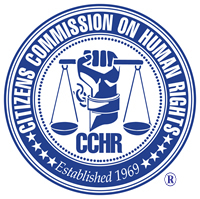Psychiatrists & Psychologists: Sexual Assault and Great Harm

Citizens Commission on Human Rights (CCHR) was established in 1969 by the Church of Scientology to investigate and expose psychiatric violations of human rights and crime and fraud in the field of mental health. A large part of CCHR's activity involves assisting individuals who have been harmed by psychiatrists and psychologists to file complaints and locate legal representation. CCHR makes law enforcement and civil attorneys aware of legal precedents and provides information and research. Finally, CCHR educates the public on the sex crimes of psychotherapists and encourages victims to know their rights, to speak out and to seek redress.
As CCHR made clear in a recent report, "Psychiatrists & Psychologists: Professional Rapists, Perverts and Pedophiles", sexual assault and exploitation of a patient in psychotherapy is common.
The statistics speak for themselves:
At least 10 percent of them admit to sexually abusing their patients. Some studies estimate that the figure is as high as 25%, and a California study claims 48%. All studies estimate that a vast majority of these rapes go unreported.
According to Robert Langs, author of the book, Madness and Cure, psychotherapists manifest three times as many incidents of "inappropriate behavior" as the people they are treating.
One report called two thirds of all psychiatrists "seriously mentally ill."
Psychiatrists divorce more than other physicians.
The United States loses approximately $100 billion to healthcare fraud each year. Up to $40 billion of this is due to fraudulent practices in the mental health industry.
"...GREAT HARM IS POSSIBLE"
 Psychotherapist and author Jeffrey Masson noted, "I do not believe that abuse in the field of psychotherapy is unusual.... Everybody should know, then, that to step into the office of a psychotherapist, regardless of the latter's persuasion, is to enter a world where great harm is possible."
Psychotherapist and author Jeffrey Masson noted, "I do not believe that abuse in the field of psychotherapy is unusual.... Everybody should know, then, that to step into the office of a psychotherapist, regardless of the latter's persuasion, is to enter a world where great harm is possible."
The damage that a psychotherapist is capable of doing when he sexually exploits a patient deserves grave penalty. And patients need to be informed that such exploitation is never therapeutic. It is only grounds for license revocation or criminal prosecution and anyone who has been so victimized should file complaints right away. The following examples are cases that did just that.
-
A married teacher at Harvard University entered into therapy with psychiatrist Joel H. Feigon in 1970 "to deal with boundary issues and her feelings about her extramarital relationship" with another man. Not only was Feigon permissive of the woman's sexual affair outside her marriage, but by May 1975, he too was having sex with her, explaining that, "…it was part of her healing to realize that her passion was good" and that "…it should not be discussed (with others) if healing was to take place." She paid him for each of these "sessions." Feigon treated the woman's two children for distress over their parents' separation. He also treated the man with whom she was having the extramarital affair (and who she later married). Though she left therapy in 1976, Feigon continued his psychiatric sex "healing" of the woman until 1981, when she ended the "relationship." In June 1996, the Massachusetts Board of Registration in Medicine revoked Feigon's license.
-
The especially sordid and secretive nature of the psychiatric profession is made very clear in what followed in the Feigon case. The woman's new husband, feeling understandably betrayed when he learned of Feigon's sexual exploitation of his wife (while both he and his wife were patients), consulted with another psychiatrist, Edward Daniels of Harvard Medical School. Daniels advised against taking public action against Feigon but instead suggested he try and get his money back for "service he had not received." In 1994 the state of Massachusetts also stripped Daniels of his license, based on complaints of sexual abuse of female patients stretching back over the preceding 30 years.
-
In 1985, California psychiatrist Stuart L. Brown began counseling a married couple for marital difficulties. During sessions with the wife, Brown talked about his family, his girlfriend and about an affair he had had, stating that "affairs were helpful and very comforting." State documents indicate that by 1986, Brown had begun giving her compliments on how she looked and told her "…you could do a lot better than your husband…kick him out." Though the woman attempted to redirect therapy toward the troubles in her marriage, Brown continued to make it about his feelings toward her, which eventually led to sexual intercourse. In April 1986, Brown began counseling another couple with marital difficulties. He met with the wife, then the husband. According to state documents, he then told the wife, "I think what you need is an affair. You'd be surprised at how much better you'll feel. Your life will lighten up." He suggested she, "Go to a hotel out of the area…only once or twice a month…but don't get too involved because it gets messy." The woman left therapy and never returned. The State of California revoked Brown's license in July of 1989.
-
On December 13, 1995 the New York Department of Health revoked psychiatrist Richard Gold's license, following a hearing which included testimony from five female patients, all of whom Gold had engaged in sexual activity, as far back as the late 1960s. Among these were two married patients who had come to Gold for help with troubles in their marriages. Gold billed the patients' insurance plans or accepted payment from them for these sex sessions.
-
New York psychiatrist Mark Bryant Morrison had his license revoked by the State Board for Professional Medical Conduct in January 1997. Among the allegations that led to the revocation was that Morrison had a sexual relationship with a female patient upon whom he used hypnosis, which he told her would "make her sex life better." With the patient in the hypnotic state, he advised her that if she repeated this to anyone, he would have her locked up and her son would be taken from her.
-
British psychiatrist Nazir Mahomedaly had his license revoked by the UK General Medical Council in April 1999 after being found guilty of serious professional misconduct. He began flirting with a woman in March 1997 when her husband was admitted to a psychiatric hospital because he was hallucinating and hearing voices. The woman, who acted as an interpreter for her husband, revealed that Mahomedaly constantly "chatted her up" and did not conduct himself like a doctor — flattering her and speaking negatively about her husband. This continued even after her husband had been discharged, as the psychiatrist bombarded her with 25 hours of phone calls from his office, making his sexual intentions clear — 69 telephone calls in all, pestering her until she agreed to have sex with him.
These are just a few of the thousands of such cases.
Recommendations
Currently, 25 states have laws making sexual contact with a patient by a psychotherapist a crime (Alaska, Arizona, California, Colorado, Connecticut, Delaware, District of Columbia, Florida, Georgia, Idaho, Iowa, Kansas, Maine, Michigan, Minnesota, Mississippi, New Hampshire, New Mexico, North Dakota, Ohio, South Dakota, Texas, Utah, Washington, Wisconsin). But such laws are necessary in all states. Enact or support such legislation.
-
If you are conducting a civil or criminal prosecution in which the defendant is a psychiatrist, psychologist or other psychotherapist, contact CCHR for assistance in locating expert witnesses and for other assistance in your case.
-
If you are dealing with reluctant witnesses or plaintiffs in a case against a psychotherapist, CCHR can provide assistance, support and act as a stabilizing influence. Contact CCHR.
-
Health insurance providers should conduct searching reviews of the reimbursement records of psychiatrists, psychologists and other therapists who have been convicted of sex crimes against patients to uncover instances of billing for "treatment" when sex took place.
-
Insist on thorough investigation in criminal complaints of sexual assault by a psychotherapist. CCHR's research and experience has shown that such complaints are not usually for isolated incidents; patterns of conduct and multiple victims are routinely uncovered. CCHR may be able to assist in locating these.
-
Visit CCHR's new museum in Los Angeles, "Psychiatry: An Industry of Death" to find out the history of psychiatry.
-
Check CCHR's database at www.psychcrime.org/database and search the 1000+ names of therapists that have been criminally convicted.

